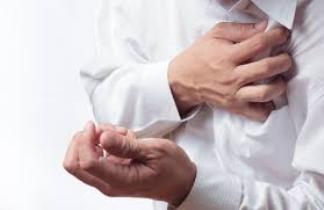What Is Heart Disease?
Heart disease is one of the leading health risks facing men today. According to the American Heart Association (AHA), more than one in three adult men has heart disease. Heart disease is an umbrella term that includes heart failure, coronary artery disease, arrhythmias, angina, and other heart-related infections, irregularities, and birth defects.
Although it may seem that something so serious should have warning signs, you may be developing heart disease without knowing it as you go about your daily life. Know the early signs of heart disease – as well as risk factors – so you can get treatment early and prevent more serious health problems.
What Are the Risk Factors?
Many men are at high risk for developing heart disease. The AHA reports that only a quarter of men met federal guidelines for physical activity in 2011. In 2015, an estimated 205 million U.S. men were obese. And about 20 percent of men smoke, which can cause the blood vessels to narrow. Narrowed blood vessels are a precursor to certain types of heart disease.
Other risk factors include:
- a diet high in saturated fat
- alcohol abuse or excessive drinking
- high cholesterol
- diabetes
- high blood pressure (hypertension)
According to the Centers for Disease Control and Prevention (CDC), nearly half of all Americans — both men and women — have three or more risk factors for heart disease.
Early Signs of Heart Disease
The first sign of heart disease is often a heart attack or other serious event. But, there are a few important signs that can help you recognize problems before they come to a head.
In the early stages, symptoms that seem like mere annoyances may come and go. For example, you may have heart arrhythmias, which can cause:
- difficulty catching your breath after moderate physical exertion, like walking up a flight of stairs
- a sense of discomfort or squeezing in your chest that lasts for 30 minutes to a few hours
- unexplained pain in your upper torso, neck, and jaw
- a heartbeat that is faster or slower than usual
- dizziness or fainting
Heart disease that involves your blood vessels is often signaled by:
- chest pain (angina)
- shortness of breath
- changes in your extremities, such as pain, swelling, tingling, numbness, coldness, and weakness
- extreme fatigue
- irregular heartbeat
These can be signs that your blood vessels have narrowed. This narrowing, which can be caused by plaque build-up, makes it more difficult for your heart to pump and circulate oxygenated blood efficiently through your body.
In addition to the above symptoms, heart disease caused by an infection of the heart can include dry cough, fever, and skin rashes.
A cluster of risk factors may also signal impending heart disease. For example, your risk of heart disease significantly increases if you have diabetes and high blood pressure.
Common Signs of Heart Attack and Stroke
A heart attack occurs when heart disease has reached the point where blood stops flowing to the muscle. The most common sign of heart attack in men is chest discomfort that includes squeezing, pressure, or pain. It used to be thought that only chest pain was a sign of heart attack, but it’s possible to have discomfort that doesn’t register as painful. This discomfort may also be present in your arms, back, neck, abdomen, or jaw.
During a heart attack, you may have:
- chest pain (angina)
- shortness of breath
- profuse sweating for no apparent reason
- nausea
- lightheadedness
Symptoms of a stroke include numbness or weakness that only happens on one side of your body. The numbness may occur in your face, arms, or legs. Other symptoms of stroke include:
- shortness of breath
- confusion, difficulty speaking, or trouble comprehending what is said
- imbalance or loss of coordination
- changes in vision
- intense headache
Many of these changes will occur suddenly and without warning. Call 911 immediately if you experience these symptoms.
What’s Our Outlook?
According to the CDC, 50 percent of men who die from coronary heart disease didn’t know they had it because of a lack of symptoms. Knowing the signs of a heart attack or stroke is one of the most important things you can do to safeguard your cardiac health. Your ability to recover from one of these events depends on how quickly you receive treatment for them.
It can be difficult to determine if you’re experiencing symptoms of a heart attack. Seek immediate medical attention if you’re concerned about any symptoms you’re experiencing.
It’s crucial to reduce your risk factors for heart disease — whether you have symptoms or not. Schedule regular check-ups even if you think you’re in excellent health. Establishing a baseline for your health will enable you to feel comfortable expressing any concerns that arise in the future.
Recommended supplements:
Omega 3 as Arctic Sea Omega- All 3 in ONE
CoenzymeQ10 as CardioHealth CoQ10
Heart disease and stroke statistics (2015). Retrieved from https://www.heart.org/idc/groups/ahamah-public/@wcm/@sop/@smd/documents/downloadable/ucm_470704.pdf
Mayo Clinic Staff. (2014, July 29). Heart disease: Symptoms. Retrieved from http://www.mayoclinic.org/diseases-conditions/heart-disease/basics/symptoms/con-20034056
Men and heart disease fact sheet. (2015, April 30). Retrieved from http://www.cdc.gov/DHDSP/data_statistics/fact_sheets/fs_men_heart.htm
Men & cardiovascular diseases. (2013). Retrieved from www.heart.org/idc/groups/heart-public/@wcm/@sop/@smd/documents/downloadable/ucm_319573.pdf
Stroke warning signs. (n.d.). Retrieved from http://www.strokeassociation.org/STROKEORG/WarningSigns/Warning-Signs_UCM_308528_SubHomePage.jsp
Warning signs of a heart attack. (2012, October 20). Retrieved from http://www.heart.org/HEARTORG/Conditions/HeartAttack/WarningSignsofaHeartAttack/Warning-Signs-of-a-Heart-Attack_UCM_002039_Article.jsp#.T3-rIdWneSo



